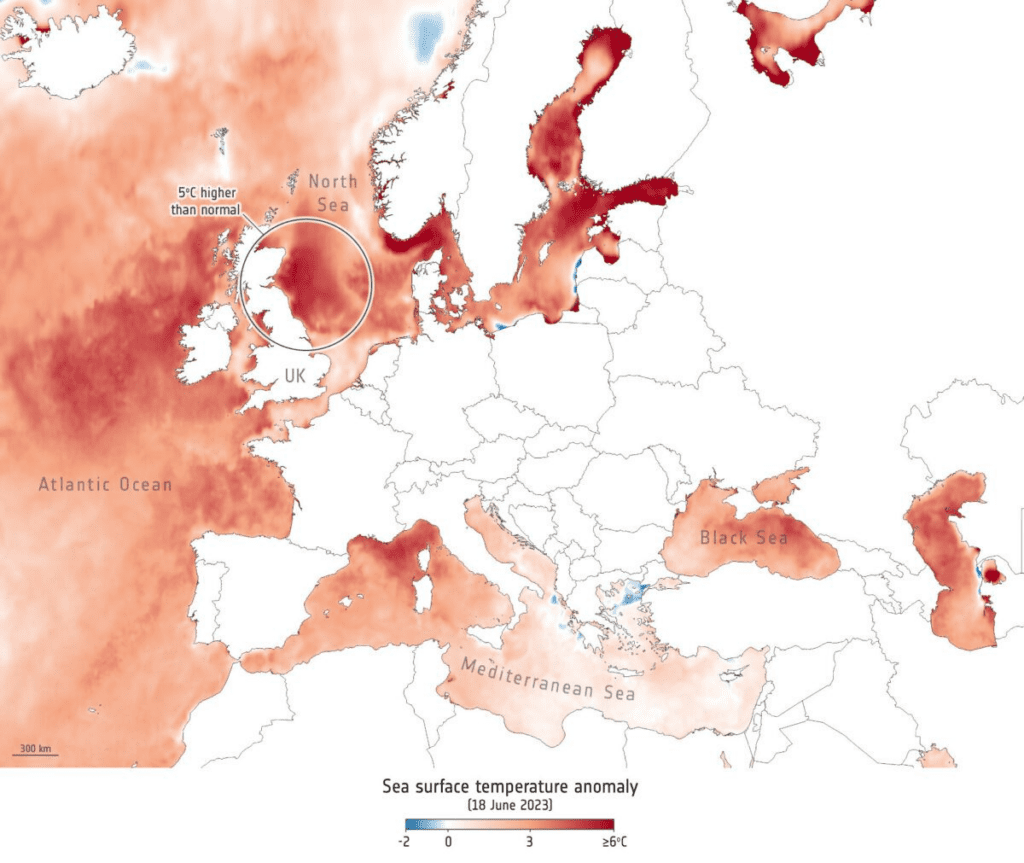A significant marine heatwave has been recorded in the United Kingdom. According to the latest data, this heatwave is affecting coastal areas along the east coast, from Durham to Aberdeen, as well as the northwest coast of Ireland. There are temperature anomalies of more than 5 degrees Celsius in the North Sea and above 8 degrees Celsius in the Baltic Sea. These sea surface temperatures are above average for this season. The maritime heatwave has been categorized as an Intense Category IV or V occurrence. This is extremely rare for this time of summer, as stated by the European Space Agency’s Craig Donlon.

This situation is extremely threatening to marine life, which includes fish. These high temperatures are linked to the intensification and prolongation of extreme weather conditions. Rising air and ocean temperatures all around the world are the reason behind the seas warming around the UK and Ireland. During 2023, April and May saw the highest-ever recorded global sea surface temperatures. Extensive records dating back to 1850, coming from the Met Office, prove this. The average temperature of the North Atlantic Ocean reached 23 degrees Celsius on June 17, 2023.
The heatwave has been classified as a Category 4 event by the US National Oceanic and Atmospheric Administration. The extreme event has been plaguing the coasts of the UK and Ireland, and its high temperatures can cause the death of fish and marine life, as well as stronger storms than usual. This also means several long-term threats to human health. The extraordinary heat in the North Atlantic is a result of several factors, including trade winds that reduce the amount of cooling Saharan Dust reaching the ocean and the influence of climate change.
Similar Post
The North Sea has also contributed to the rapid rise in sea surface temperatures with its calm seas and sunny weather. The heat waves that were unprecedented have now spread across the globe. They have led to extreme heat incidents and wildfires in Canada, while China and Serbia have seen extreme heat waves, and the Antarctic Sea ice has reduced. A prediction made by The Copernicus Climate Change Service predicts that June 2023 will see records that have never been recorded before in terms of heat levels globally. It is predicted that the trend will continue, making 2024 the hottest year ever recorded.
It is crucial to keep an eye on certain aspects, including how the marine heatwave is impacting the marine ecosystem, the aquaculture and fisheries industries, local wind patterns, and extremely crucial rainfall events. A combination of satellite and ground-based data will enable valuable insights to be produced in terms of monitoring. The warming trends in the Tropical Pacific, associated with the El Niño system, and the warming of surface waters in the Pacific and Atlantic Oceans have global implications.
Arctic Sea Ice would continue to decline if excess heat caused by these heatwaves infiltrates the Arctic Ocean via ocean currents. The North Sea is also plagued by Noctiluca algae, which is also called “sea sparkle.” These blooms have unusual and negative implications for oxygen levels and plankton populations.


















